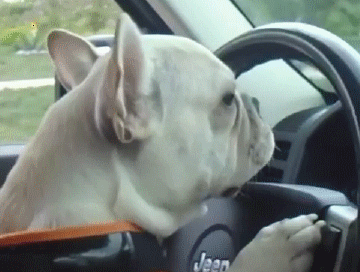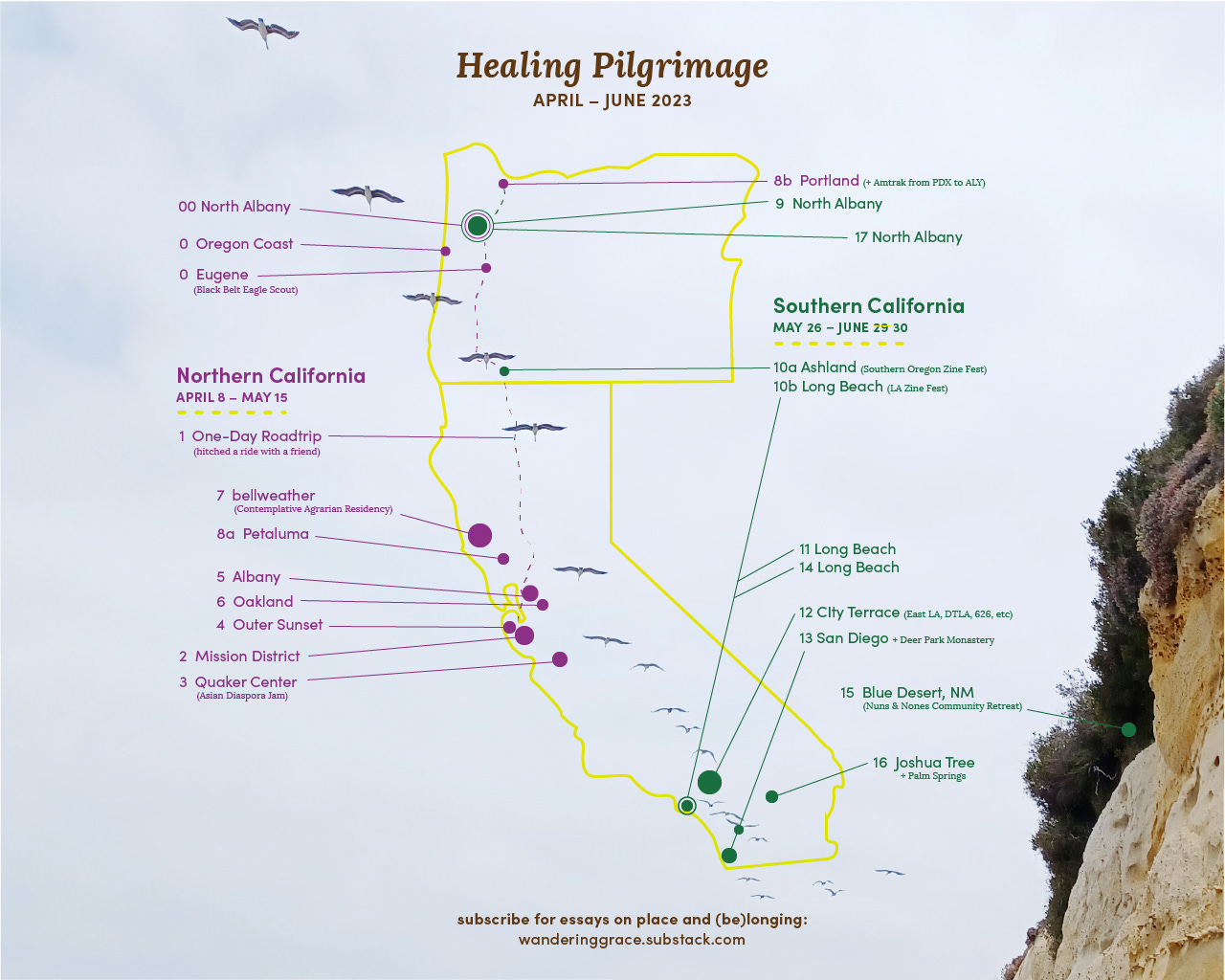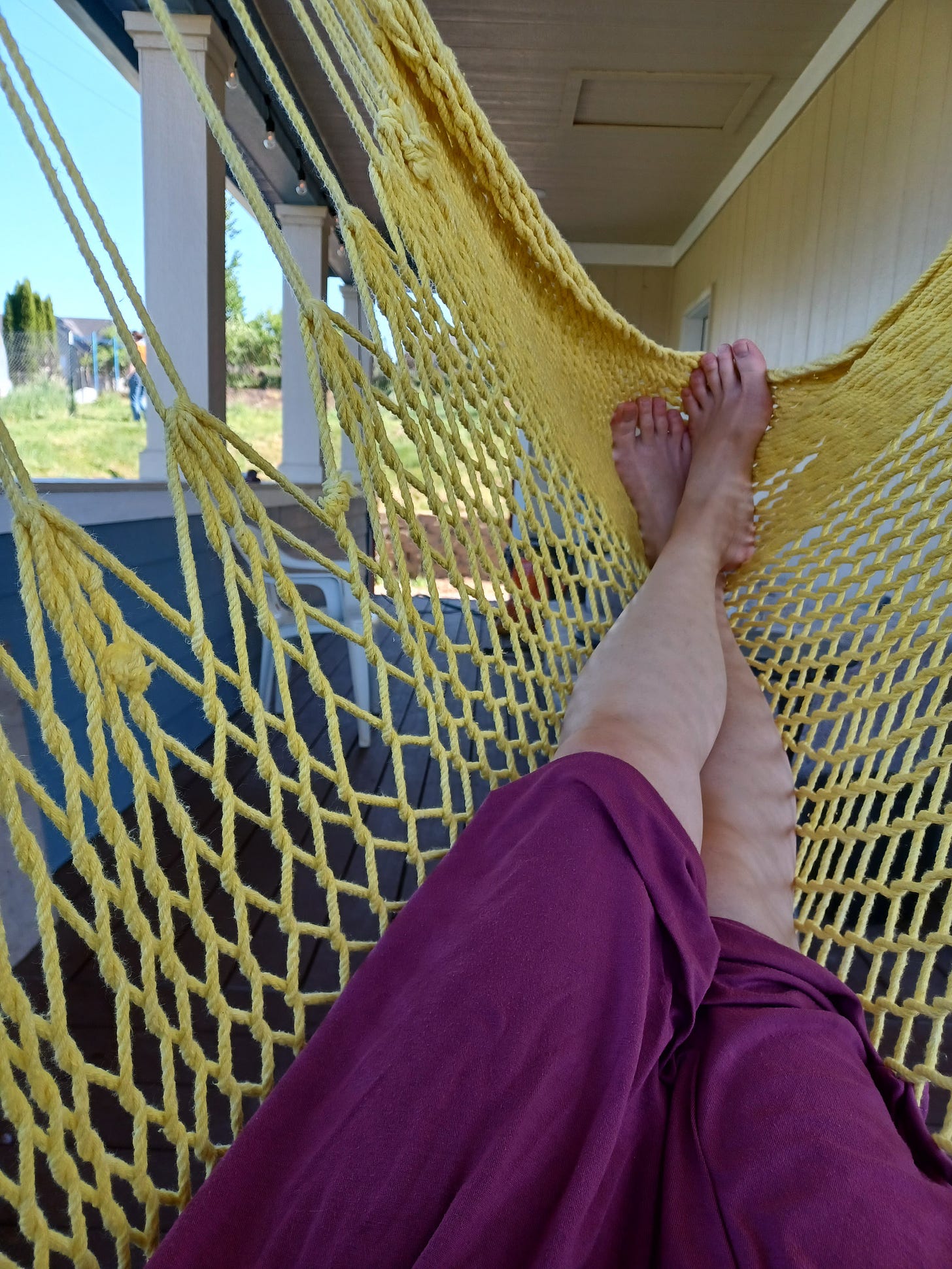Squirrel Brain Tries to Buy a Car
Anxiety as a Mode of Flight (so many ways to run away while ostensibly sitting still)
Welcome to Wandering Grace. I share essays exploring the themes of place and (be)longing 1-2 times a month, and sometimes bonus snapshots from the road. Read more about the project here. See an archived list of essays in-order here.
Last essay, we left petaluma wondering about intactness across interrupted lineages, and rabbitholed about class in America in our bonus.
During my last days in the Bay Area, before my flight back to Oregon, my bird body desperately wants to keep going south instead.
A few days later, my bird body arrives back in the Pacific Northwest, and my monkey brain promptly takes me away again. I have a well-worn escape route to escape my current reality: that my body is in a place when I don’t want to be here.
This desk piled high with plans and lists and scenarios that have yet to come to fruition is a hamster wheel of: Research without action. Planning without outcome. Dreams without manifest.
***
I have a 10-day break at home at the Common Canary co-op in-between the Northern California leg and the Southern California leg of my Migration Tour. This will be time to reground, to finalize lodging and plans for Los Angeles, to repack for different seasons and different weather, to prepare for two zine fests coming up.
I decide to try and treat my time in Oregon like a stay-at-home artist residency.
Instead, I spend a huge chunk of my time trying and failing to buy a car through Carvana.
From my journal that week:
“If NorCal was about releasing baggage around baggage, I suspect that SoCal is about drama trauma around cars. Since I am in a ‘manic’/‘hyper’ (aka dysregulated state)1 trynna buy a car in the week before my trip. So silly and so like puzzle brain, not logical — not in a fun common nonsense kinda way but in a you’re expending a lot of energy to avoid feeling something kinda way.”
I’m sure I can figure out this puzzle: of buying a car online, from Oregon with an Oregon driver’s license and registration, that I can pick up while I’m in California, so that I don’t have to rent a car while I’m in LA, and which I can drive back with on the tailend of my trip, to then have a car of my own in Oregon.
***
I’ve escaped into books (as fantasy, as limerance, as daydreaming) since childhood.
These ruminative thought spirals are newer. This compulsive planning came online during 2020 as an adverse side effect of all the things I couldn’t control at the time: pandemic and police brutality and racial gaslighting and wildfire smoke.
I can now name the compulsive behaviors as minions of anxiety: the endless scenario planning that manifests itself as research and lists and scheming and spreadsheets that dead-end in fear and worry and the need for more planning, more learning, more preparing, more waiting. The plans are squirrel-like attempts to shore up safety against an uncertain future, gestures toward “I’m thinking about it, okay?!” as a way to check off to-do list items without actually doing any to-do’s.
These days, I know that if I’m spiralling into squirrely anxious behaviors, that means I’m avoiding making some kind of decision or avoiding taking some kind of action. Usually because I’m avoiding feeling some kinda way.
***
(…that you’ve been talking about buying a car for years, but still don’t have a car) incapable
(…because it costs too much to rent a car in LA for three weeks, let alone buy a car this year) worthless
(…which requires proving to a car-loan person that my non-existent income is enough to finance a car) illegitimate
***
The tricky thing about anxiety2 is that there is usually some nugget of need underneath the tangled net of thoughts.
In this case, not having my own car in Corvallis (and then Albany) for so many years decreased my sense of autonomy over time.
Years before moving to Oregon, I had willingly (and willfully) sold my car in San Francisco, partially for environmental reasons, partially to unburden myself from all the ongoing responsibilities this hunk of metal entailed, and partially to see if I could make it work without — in fulfillment of a longtime goal to live car-free. In the Bay Area, with my bike and public transportation and an apartment in a prime location of the city, I could and happily so.
Moving to Oregon, the challenge transformed: Could I still live car-free in a place without as much public transportation infrastructure?
My partner owned a car, and we were living together, and mostly I was working at home at first, so it made sense to keep trying to see if we could make sharing their vehicle work.
Slowly, slowly, it shifted from a fun challenge to something less okay — in ways that were too small and imperceptible to trace. Because I became co-dependent with them (and eventually their mom because she had a car that we could sometimes borrow to keep trying to make sharing vehicles work) — as I was constantly asking permission to use a car, as I weighed the priorities of their work vs my work vs the hit to their mental health if getting rides with their parents vs the hit to my mental health if I couldn’t go for midday hikes, as I puzzled whether and how to get another job if it wasn’t bikeable or bussable, as I found myself choosing the easier route of staying home if it meant I didn’t have to do the extra labor of figuring out transport.
The puzzle of it was what I got used to doing and where my energy went. Instead of asking myself: what I want. Instead of anchoring in: what my non-negotiables are. Instead of remembering: that I could get a car.
Because my squirrel brain can make this sharing-vehicles thing work, can puzzle it out, can figure it out!!
***
In Dez Davis’s “More Money More Magic” course, we explored our relationship to various categories of money, including Toxic Money. She describes toxic money as any situation where the giver or receive of money is inside of a relational dynamic that handicaps their earning potential, or wherein they need to stay disempowered in some way in order to continue receiving those financial resources. This can be between individuals, between people and family/cultural systems, or between people and institutions.
An example is receiving healthcare through your state Medicaid that would go away if you make too much money.3 An example is being owed child support but not receiving it in the limbo of a divorce settlement. An example is living with your family in a way where the only emotions you are allowed to express is gratitude and obeisance.
There might be an emotional tax or a mental or psychological price to pay for receiving actual resources. These subtle emotional feedback loops affect our relationship to money, scarcity, and ultimately our sense of our capacity to take care of ourselves. Toxic money has undercurrents of fear and stuckness and disempowerment.4 It comes down to power dynamics.
***
I definitely felt the disempowerment of toxic money, but my flavor of disempowerment was decidedly crunchy — as in granola — as in hippie — as in rooted in the aspirational values of restoring the commons, especially via a praxis of sharing resources such as vehicles and cooperative housing.
It’s not like I willingly gave away my power. It’s not like the people I was in these sharing/giving/receiving relationships in were intentionally trying to disempower me.5
The disempowerment happened slowly over time because I was centering the values of connection, harmony, adaptability, and community without a foundational backbone in…my self.
I was always willing to expend my energy to make-do with what we had (puzzle brain, squirrel brain), but never wanted to spend any extra money even if it would my life easier.6 In budgets, always reducing what I needed but never considering how I could increase what flowed in (whether incomes, cars, or income to get cars).7
In doing so, I was putting my values (thrift, commons) ahead of my needs (mobility, freedom), and negotiating away my autonomy in the process…even though I didn’t realize it at the time.
Compromise is about letting go of attachment to our ideas about how we’re going to get our needs met, not about compromising the needs themselves.8
***
Were you taught healthy boundaries and healthy interdependence? Or were you taught various forms of codependence masquerading as love and commitment and belonging and power?9
I know and don’t know how I learned that I wasn’t powerful and that I should put others’ needs ahead of my own and that I should never directly ask for what I need because that’s too needy. I was pretty good at reading the emotions and needs in a room, but I had a harder time telling you what I myself was feeling or needing without first gauging it against what (or who) was going on around me. That’s the set of behaviors and patterns I was working with when I landed in Oregon.
***
Christina’s crash-course in independence, co-dependence, and interdependence:10
AGENCY =
The person who is responsible for meeting my needs is myself.
SELF-EFFICACY =
Confidence that I can meet my own needs.
(TOXIC) INDEPENDENCE =
I can meet all my needs for myself without having to ask for help or rely on others.
INTERDEPENDENCE =
I trust that collectively we can meet all the needs that arise. I can make request of others to help meet my needs.
CO-DEPENDENCE11 =
When I make requests of others, they have to say yes for me to get my needs met so that I can be okay
OR Others must guess and meet my needs without my having to ask.
IN OTHER WORDS: Putting the responsibility of meeting my needs into another person’s hands, which gives them power over my okayness. (Or vice versa: assuming and taking responsibility for someone else’s needs and attendant emotions and okayness.)
INTERDEPENDENCE WITH MUTUAL AGENCY IN TACT =
I trust that collectively we can meet all the needs that arise. I trust that I can turn to others to get my needs met. I can make requests of others to help meet my needs. And they are free to say yes or no or maybe depending on their own needs, capacities, and boundaries. At my core, I know I’ll be okay because I know I can get my own needs met, whether here or elsewhere.
***
This dance between interdependence and co-dependence is an ongoing question for me as I/we keep moving toward attempts at solidarity economy12 in the form of shared resources, shared housing, stewarding commons together. What I’m coming to realize is that you can’t have healthy interdependence without foundations of individual agency — which requires that each person has enough access to her13 own independence and power, so that it’s a real choice whether they stay or leave.
The part that I’m grappling with now: Taking responsibility for the ways I disempowered myself by underearning to follow call instead of career, which decreased my own ability to be in healthy interdependence with the resources that were available to me.
Including sharing a car. Including living in cheap or no-rent cooperative housing.
Because I worked myself into a corner of not being able to choose to leave, which means I simmered in a noxious brew of stuckness and resentment and powerlessness for years.
***
My expansive bird body no longer wanted to be in Oregon, but my scared monkey brain didn’t know how I could possibly leave because I didn’t have the $$$. So my squirrel brain started planning and burying herself in spreadsheets. And my bird heart fed me a steady diet of books and flights of fancy to self-soothe.14
Eventually, the combo of dreaming + planning helped me map a way out.
And having a map meant I could practice making decisions again — to ask for help from friends to get some of the things I needed for free. AND maybe more importantly, I had to practice deciding to spend money again when it would help me get my needs met, when it would make my life just a little bit easier. Which became a signal to my monkey brain that I was taking my own needs seriously, so she was able to calm down, bit by bit. Which gave my bird body just a little more space.
***
I rent a car in LA in May.
I buy a car in OR in October.
Actions toward to-do’s that are getting me closer to my goals. And a growing self-trust that I am listening to myself again.
Sitting in the driver’s seat, the feeling that I get that I haven’t had in years, that I had learned to live without, for so long that I forgot that it was possible:
That I can go anywhere, at anytime, without telling anyone.
That I could drive south and keep going south simply because I wanted to.
Is freedom.
NEXT ESSAY: Lodging gets squirrely, and I have to decide whether to spend even more money in the face of nervous-system-fears to get a ‘room of one’s own’. Stay tuned!
TWO IDEAS FOR THE NEXT BONUS: 1) My path to regaining autonomy also included a season of formally sharing a car named Sufjan with my coop housemates. For my next bonus, I could either share more details and stories about how that system worked to better empower all of us. Or 2) I could turn the “crash course in co-in(ter)-dependence” above into a zine with fuller acknowledgements page.
Lemme know in the comments if you have a preference!
see tayla shanaye’s nourishing the nervous system
about any runaway feeling or part, really. (see internal family systems or Self Therapy by jay earley)
an immigrant inheritance, if i ever heard one.
see Matthew Desmond’s Poverty, by America about the large gray area between federal poverty lines and what it would take to actually survive our current class-segregated system.
Dez Davis offered these statements as barometers of how embroiled you may be in toxic money, on a scale of 1 to 10: “I have power in this situation” “I can step out of the battle and set a boundary here” “I can create the life I want”…
though there were definitely class+power dynamics at play.
see Paco de Leon’s Finance for the People, which addresses this practically, and also systemically e.g. why don’t more budgeting and personal finance books talk about the possibilities for increasing income instead of shaming people for enjoying their avocado toast.
also shoutout to Pamela Capalad and Brunch and Budget for budgeting frameworks that help us reframe ‘wants’ as also needs, for those of us who would otherwise shrink to spartan measures to make-do if given half the chance.
see meenadchi’s decolonizing nonviolent communication workbook
not all co-dependence is unhealthy…there’s some decolonial lens and disability justice lenses to keep being in questions about here…(see craig on the encumbrance of care)
"crash course” = 4 years and counting for boundaries 101 on a foundation of re-embodiment, somatics, decolonizing praxis, a metric ton of mindfulness, and an ongoing inquiry into power kicked off by being in circle with catholic sisters. But flowers to: Meenadchi (DNVC), Mia Schachter (Consent Wizardry), and Cyndi Suarez (Power Manual) for specific boundary lessons.
textbook Melody Beattie’s definition is: “A codependent person is one who has let another person’s behavior affect them and who is obsessed with controlling that other person’s behavior.”
breadcrumbs for solidarity economy: NEC, beautiful solutions, cooperative journal media, this upstream ep…..
if we are talking about financial independence and autonomy, i want to be intentional about the use of “her” to visibilize the systemic gender+power dynamics that shape who underearns in partnerships, how women and men fare differently after divorces or breakups, and whose labor gets underpaid when persons choose to forego paid income to do care work (see sylvia federici on ‘wages against housework’ or ed whitfield ‘on liberated zones’, or even sheryl freakin sandburg on ‘leaning in’)
see audre lorde’s “poetry is not a luxury” and Tricia Hersey’s Rest is Resistance on the importance of dreaming.








